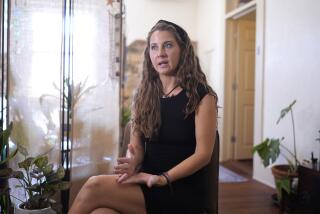Must Reads: ‘I didn’t want this baby’: Rohingya rape survivors face a harrowing choice
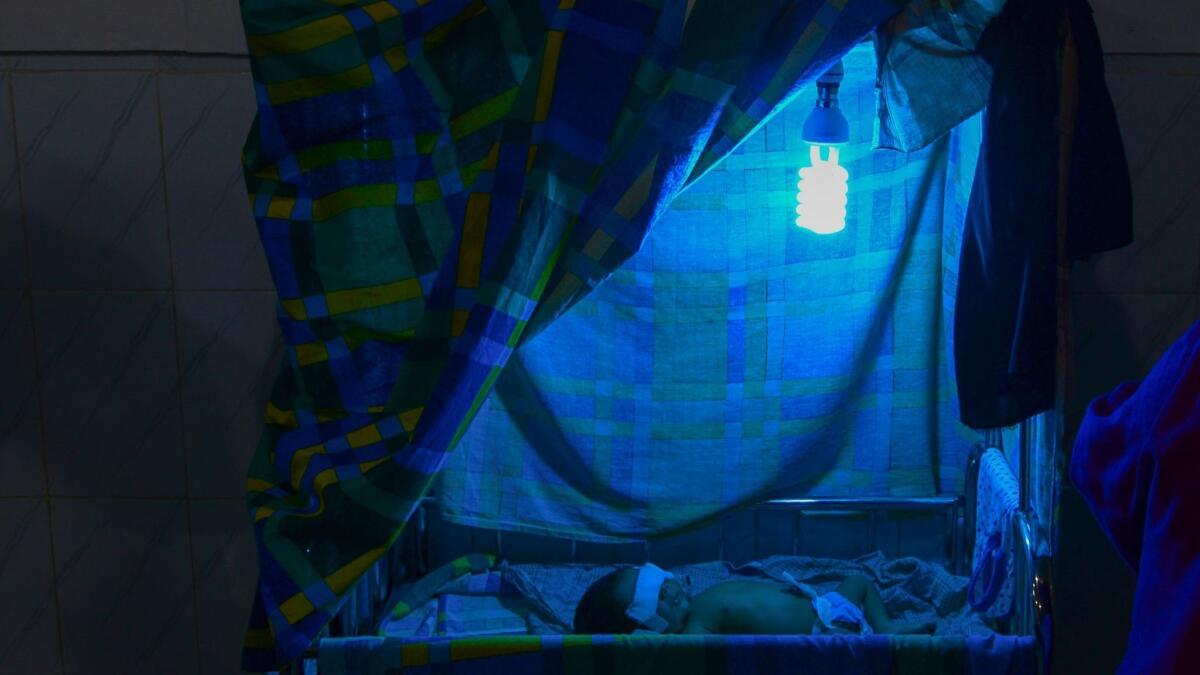
- Share via
Reporting from Ukhia, Bangladesh — The 3-month-old boy has no name.
His mother, Uma Suleiman, cradles him during the sweltering nights when he can’t sleep, patting his bare back with her palm. She had done the same for her other children, all of whose names arrived easily to her, all of whom she loved without hesitation.
But when she sees the boy lying in her arms, she relives a nightmare.
He is an innocent reminder of the day last year when soldiers burst into her village in western Myanmar’s Rakhine state and chased her into a rice paddy. There, she said, two men in army uniforms raped her and left her bleeding in the dirt.
She is one of thousands of Rohingya Muslims who were sexually assaulted during a systematic campaign of brutality by Myanmar security forces that international investigators and human rights groups have described as crimes against humanity. The army has denied committing atrocities.
In the overcrowded refugee camps in Bangladesh where more than 900,000 Rohingya have sought shelter — many having watched their homes burned, children mutilated and family members shot — the mass rapes have produced untold numbers of unwanted pregnancies and confronted survivors with a terrible choice.
Many women and girls have quietly terminated their pregnancies in relief clinics or by ingesting cheap drugs, sometimes resulting in medical complications, doctors say.
Others have weighed the stigma of bearing a child out of wedlock in a deeply conservative society — and of caring for one in the midst of a humanitarian emergency where families live on handouts — and opted to give birth despite the uncertainty.
Uma Suleiman’s decision was all the more wrenching because she is a widow, having lost her husband to an illness several years ago, and at age 30 had already borne five children.
After marrying off her eldest daughter at 16, she was raising the others alone in the sprawling Balukhali refugee camp, in a shed of bamboo sticks and plastic sheets propped on a rocky hillside by sandbags.
Her older children were adamant: The child growing in her belly was not one of them.
“I didn’t want this baby,” she said. To name him, she thought, would be to accept what happened to her, to make it normal.
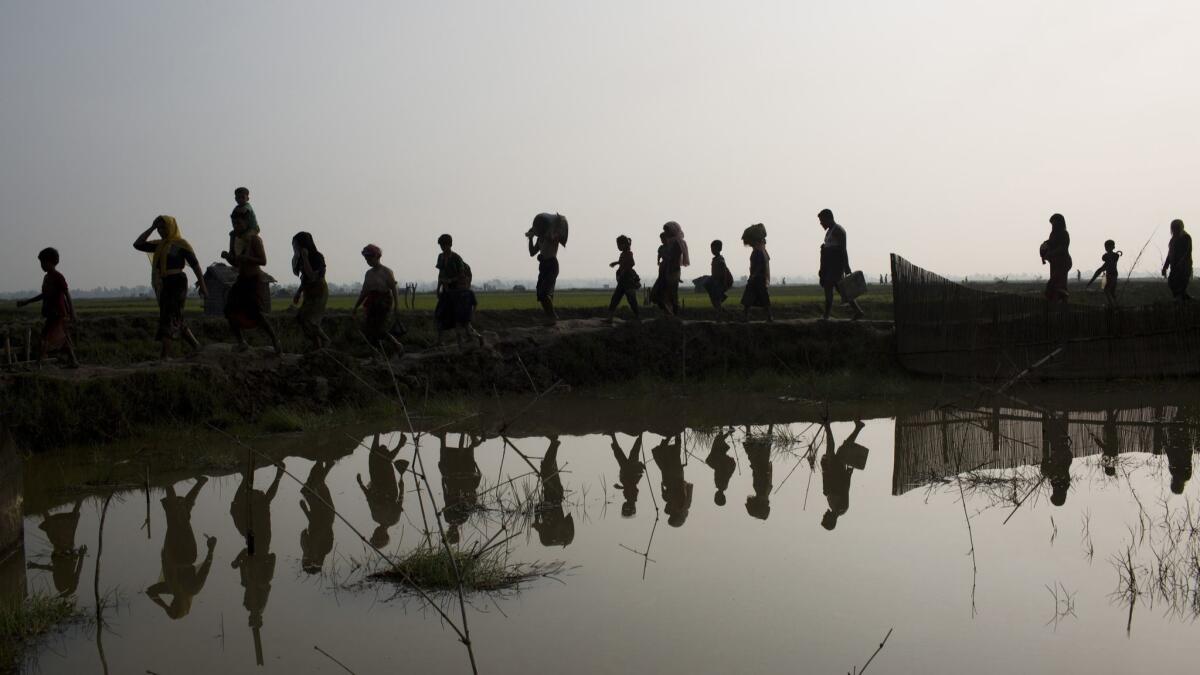
Sexual violence has been a devastating hallmark of Myanmar’s long persecution of the Rohingya, forced by the Buddhist majority to live under an apartheid system in their native land. Authorities in Myanmar have denied the Rohingya basic rights, including regular access to medical care, meaning many rape survivors remain unaware of treatment options even when they reach the relative safety of the refugee camps.
The United Nations and humanitarian agencies recorded more than 6,000 incidents of gender-based violence against Rohingya Muslims in a seven-month periods beginning in late August 2017. That was the month the Myanmar army, responding to Rohingya militant attacks against police posts, launched deadly “clearance operations” that drove nearly 700,000 people from their homes, one of the greatest exoduses in modern times.
“Rape with impunity has been characteristic of the attack on Rohingya women and girls for years,” said Matthew Smith, co-founder of Fortify Rights, an advocacy group that has extensively studied Myanmar.
“Soldiers used rape as a tool in a larger attack aimed at destroying at least part of the Rohingya population. In legal terms we’re in the landscape of genocide.”
According to Human Rights Watch, Myanmar forces also raided several Rohingya villages in June 2017, the month Uma Suleiman said she was raped. Like other women interviewed for this story, she spoke on condition that her photo and the name of her village not be published.
Uma Suleiman said that soldiers, recognizable in their green uniforms with red patches, stormed the village one afternoon, scattering residents into the surrounding fields. When two soldiers caught up to her and drew a knife, no one was around to hear her cries.
Villagers didn’t find her until after nightfall.
There was no doctor or clinic nearby, so she never sought treatment, not even after she and her children reached Bangladesh last September. She learned she was pregnant the way she always had: in her fifth month, when the bump began to appear around her middle.
Other refugee women told her she could buy pills for about $20 that would induce premature labor. The owner of a dispensary in the camp at first refused to sell to her, saying her pregnancy was too advanced.
But she begged.
“I said I did not want to have a fatherless child. Finally, he agreed,” she said. “He told me that if the medication worked, it would be my good fortune. So I swallowed the pills for four days.”
The pills just made her vomit.
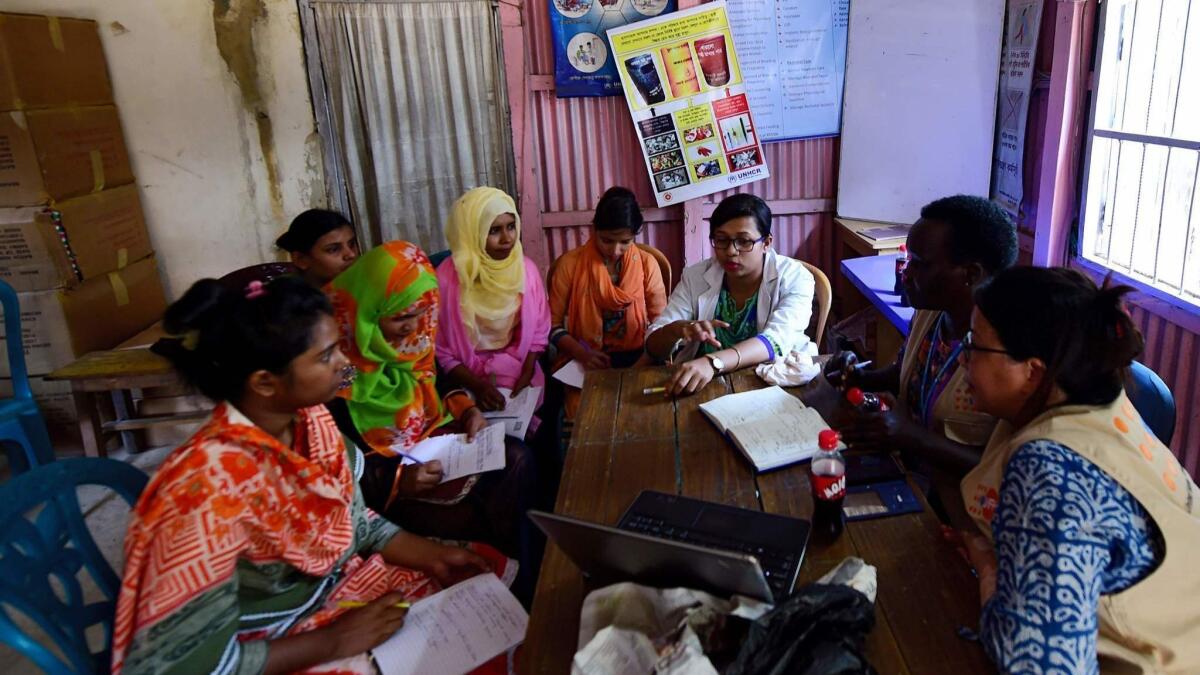
Bangladeshi laws permit abortions during the first 12 weeks of pregnancy, and after that only when the mother’s life is in danger. Relief workers say that many women in the camps have attempted risky late-term abortions on their own, without medical supervision.
Daniela Sofia Cassio, a midwife with the medical charity Doctors Without Borders, said its clinics have routinely treated women who had experienced incomplete abortions.
“By the time they come to seek help, they’re almost about to die — they’re bleeding heavily or suffering severe infections,” Cassio said, adding that some patients died of septic shock.
From August through April, Doctors Without Borders counseled or treated 377 survivors of sexual violence — including girls as young as 7 — at its hospitals and health posts across the camps. The group believes this is a fraction of the total number of victims.
Among them was Majida Begum, 23, who said she was raped by soldiers in the woods outside her village in August. Unmarried with no siblings, she had an anguished conversation with her parents after they escaped to Bangladesh.
But there was no doubt about what she would do. She visited a clinic during her third month and took the pills, ending her pregnancy.
“My parents will die soon, and I don’t have anyone to support me. I need to get married,” she said. “If people hear that I was raped then I will not find a husband.”
In early May — nearly nine months after the Myanmar army launched its offensive — humanitarian workers raced through the camps trying to identify expectant mothers before they abandoned newborns or died without receiving care.
By month’s end, aid agencies had not recorded a significant rise in births, leading relief officials to believe that many women and girls had delivered babies in their huts, where they usually go unrecorded, or ended their pregnancies.
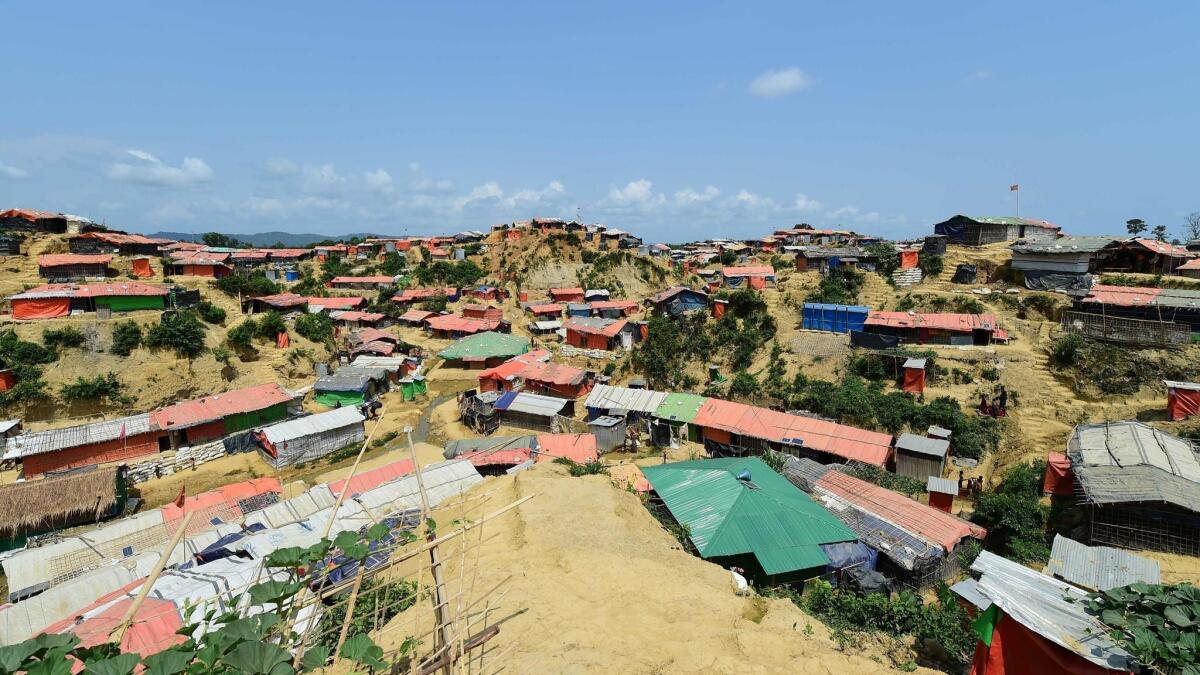
Yet scattered across the camps — an unforgiving landscape of sadness and loss — are mothers who weathered the trauma and derived from it something beautiful.
Fatima, 25, said she was gang-raped by a half-dozen soldiers last June in Maungdaw district, at a time when her husband, Mohammad Hussein, had fled the village to escape arrest. Reunited four months later in the Kutupalong refugee camp, Hussein saw she was pregnant and immediately thought, “My world was falling down.”
“I thought he would divorce me,” Fatima said.
But they had lost their first child to pneumonia two years earlier, and the idea of forsaking another filled the couple with distress.
“We never thought of abortion,” said Hussein, 35. “This happened to a lot of women. We thought, Allah will take care of this child.”
They named her Samira, which in Arabic means “she who is loved.” Now nearly 4 months old, she dozed on a sheet of cardboard inside a wooden cradle Hussein had bought in the camp, using money he earned hauling bricks and bamboo for construction. Her fingers were streaked with red paint, which her parents believed would make her beautiful.
When she awoke, Hussein’s weary eyes brightened as he scooped her up and balanced her on his knee.
“If we had not had this baby,” he smiled, “we wouldn’t have experienced this joy.”
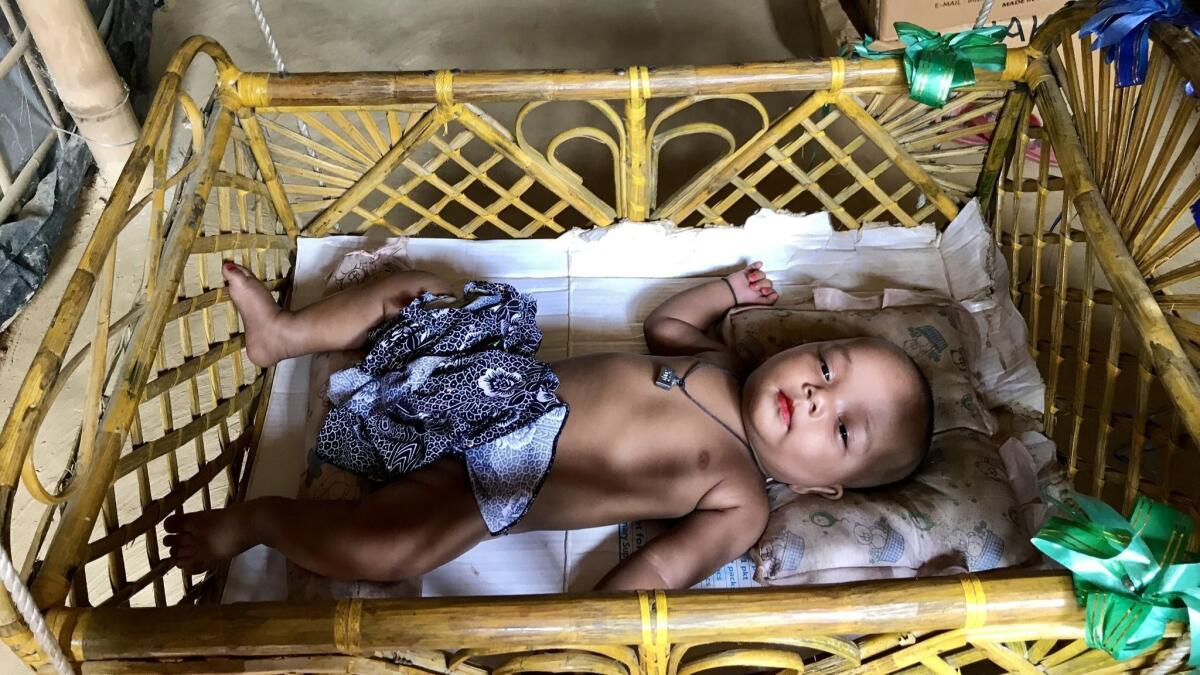
After her abortion attempt failed, Uma Suleiman began to prepare. She had no money, so she and her 15-year-old daughter Zainab fashioned a cradle from wooden sticks, rope and an empty sack from the rice they receive as food aid.
“When I think about what happened to my mother, I cry,” Zainab said.
At a Doctors Without Borders clinic, shortly before she delivered, Uma Suleiman was told of another option: She could give the baby up to another Rohingya family. Relief groups have worked to identify refugees willing to adopt newborns, although Daphnee Cook, a spokeswoman for the humanitarian agency Save the Children, said it was “impossible to know the exact number of babies that have been given up, or are likely to be given up, because not all cases are properly reported.”
Ultimately, Uma Suleiman could not do it.
“I decided: This happened to me,” she said. “It wasn’t anything I did. So I thought I should keep the baby.”
He was born healthy and is growing, though he struggles to sleep in their steamy shed. Uma Suleiman’s daughters have grown attached to their new brother. Zainab holds him at night when her mother needs to rest, and 12-year-old Rukhia looks after him when she goes to pray.
Yes, Uma Suleiman thinks now, she can love this child.
But there was still the matter of his name. Zainab had been thinking. She looked up from a corner of the hut where she was scrubbing a dented pot and offered her suggestion: Hazrat Belal, the name of a companion of the prophet Muhammad who summoned the faithful to prayer.
Uma Suleiman cast a faint smile at her daughter. “Hazrat Belal,” she repeated. It was starting to stick.
Shashank Bengali is South Asia correspondent for The Times. Follow him on Twitter at @SBengali
ALSO
Rohingya Muslims who escaped the Myanmar army now brace for a threat they can’t outrun: Rain
How a humanitarian crisis tarnished Nobel winner Aung San Suu Kyi’s legacy, perhaps forever
More to Read
Sign up for Essential California
The most important California stories and recommendations in your inbox every morning.
You may occasionally receive promotional content from the Los Angeles Times.


